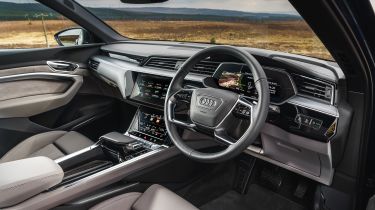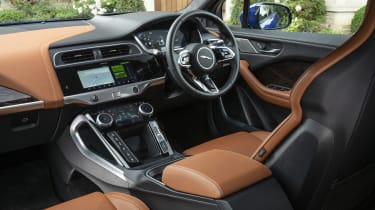Audi e-tron 55 quattro vs Jaguar I-Pace EV400: interior, comfort & practicality
The Audi is a usefully roomier family SUV, although the Jaguar is still spacious and comfortable enough for easy family motoring

If space and practicality are priorities, then the Audi will be better for you. It’s a slightly bigger car than the Jaguar and has a more squared-off SUV shape overall, which shows in the deeper boot space and more generous rear passenger space.
Four tall adults will be more than comfortable in the Audi, but the Jaguar isn’t bad on this front. Access to the rear seats is less ideal, as the apertures are narrower than those of the Audi and the roof a touch lower, but once you’re in, there’s enough room for an average-sized adult to sit very comfortably behind a tall driver.
The boot, too, is more than big enough for a couple of chunky suitcases, but the sloping window makes it less ideal for an Ikea run and the Audi has a bigger boot in general. Both have shallow front storage spaces under the bonnet and both have underfloor storage areas in the boot.
A driver of just about any shape and size will be able to get comfortable in our two plush electric SUVs, which both have power-adjustable seats that offer a broad range of movement, including lumbar adjustment. The Jag’s seats are particularly great, as they curve around your shoulders and feel very supportive and comfortable, where the Audi’s are a touch softer and more armchair like.
When it comes to dashboard design, both of these cars are a minimalist delight. Touchscreens dominate, of course, but the overall density of materials and ease of use that the more cohesive screen interface offers makes the Audi easier to use.
The overall ambience and sense of quality in the Audi’s interior is one factor that goes a long way to justifying its high price, even if some of the plastics lower down in the cabin can feel a bit scratchy.
The same can be said of the Jaguar, which is also an exercise in soft leather, glossy plastic and bold architectural lines, while a higher central armrest and lower seating position gives a sense of being ensconced compared to the higher-set position of the Audi.
Equipment
The Jaguar I-Pace HSE comes with pretty much everything you could want. Full leather upholstery with powered seat adjustment and memory function, heated and cooled front seats, heated rear seats, a powered tailgate with handsfree function, 12-inch alloys and full Matrix LED headlights. Adaptive mood lighting is one £200 option that might appeal, and metallic paint costs £700, but otherwise there’s not a lot you could want to add other than style tweaks.
The Audi is well equipped with most of the comforts and luxuries you’d expect including climate control, cruise control, leather upholstery and power-adjustable, heated front seats, but there are a few options you’ll likely want to add.
Matrix LED lights are a £1,350 option, while heated rear seats are £400 and cooled front seats £800. A £1,850 Comfort and Sound pack that brings Bang and Olufsen audio, a 360-degree camera and extended LED mood lighting is also likely to be a popular choice. A fixed glass roof will cost £950 for the Jaguar, while Audi’s panoramic sunroof is a £1,450 box to tick.

Essentially, if you’re not fussed about having the ultimate luxuries, then you needn’t add anything to these cars, but stack them up like-for-like and the Jaguar gets you more treats and tricks for less cash.
Connectivity
The Audi’s twin-screen system certainly looks smart and the graphics are probably sharper than your telly. The sheer amount of screenage is a bit daunting at first if you’re not used to having so much touchscreen in a car, but with the main comfort features – air-con, heated seats, etc. – controlled by the lower screen, and media and navigation taken care of by the upper screen, it's quite easy to use.
Cleverly, the lower screen doubles up as a full keyboard or pad for you to write the destination in and of course there’s voice-control, too – although we found it frustratingly poor at correctly recognising commands.
The Jaguar’s system also looks great with its glossy panoramic screen, but the menus are a bit less logical, the graphics a touch grainier and the screen response a mite slower. It isn’t bad to use, but the Audi’s is certainly easier on the first try.
Both have most of the features you could want, including multiple USB inputs, Bluetooth, Apple CarPlay and Android Auto, as well as sat-nav with a charger-finding feature and online functionality for live traffic updates and satellite view. The Jaguar doesn’t get wireless phone charging, though; the Audi features it as standard.
What are the apps like?
Both the Jaguar and Audi have smartphone apps that allow you to start or stop charging, set timed charging parameters as well as warm or cool the interior ready for your expected departure time.
However, both have poor owner reviews online, with reliably remaining connected to the cars being one of the main issues, as well as problems with connecting after app updates and – for the Jag’s InControl Remote in particular – slow responses. Our experience of the Jaguar app reflects that; we found it clunky to use and it intermittently lost connection with the car altogether.


